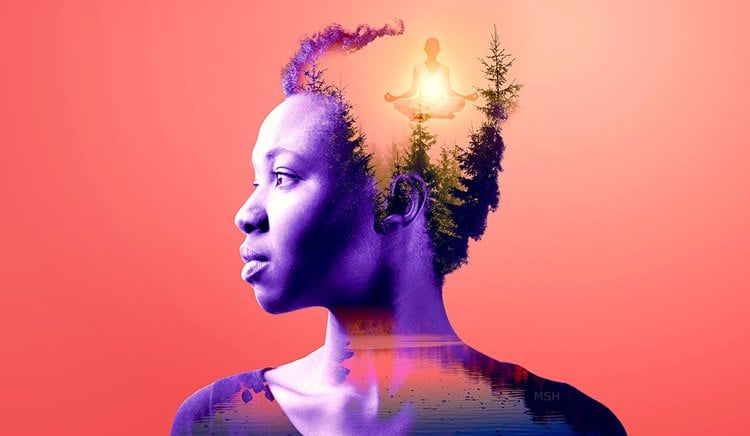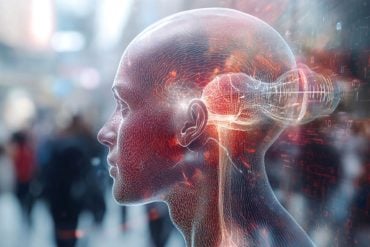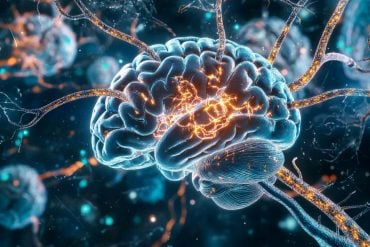Summary: Researchers say the inferior parietal lobe, thalamus and caudate play key roles in processing spiritual experiences.
Source: Yale.
Yale scientists have identified a possible neurobiological home for the spiritual experience — the sense of connection to something greater than oneself.
Activity in the parietal cortex, an area of the brain involved in awareness of self and others as well as attention processing, seems to be a common element among individuals who have experienced a variety of spiritual experiences, according to a study published online May 29 in the journal Cerebral Cortex.
“Spiritual experiences are robust states that may have profound impacts on people’s lives,” said Marc Potenza, professor of psychiatry, of the Yale Child Study Center, and of neuroscience. “Understanding the neural bases of spiritual experiences may help us better understand their roles in resilience and recovery from mental health and addictive disorders.”

Spiritual experiences can be religious in nature or not, such as feeling of oneness in nature or the absence of self during sporting events. Researchers at Yale and the Spirituality Mind Body Institute at Columbia University interviewed 27 young adults to gather information about past stressful and relaxing experiences as well as their spiritual experiences. The subjects then underwent fMRI scans while listening for the first time to recordings based on their personalized experiences. While individual spiritual experiences differed, researchers noted similar patterns of activity in the parietal cortex as the subjects imagined experiencing the events in the recordings.
Potenza stressed other brain areas are probably also involved in formation of spiritual experiences. The method can help future researchers study spiritual experience and its impact on mental health, he said.
Source: Bill Hathaway – Yale
Publisher: Organized by NeuroscienceNews.com.
Image Source: NeuroscienceNews.com image is credited to Michael S. Helfenbein.
Original Research: Abstract for “Neural Correlates of Personalized Spiritual Experiences” by Lisa Miller, Iris M Balodis, Clayton H McClintock, Jiansong Xu, Cheryl M Lacadie, Rajita Sinha, and Marc N Potenza in Cerebral Cortex. Published May 29 2018.
doi:10.1093/cercor/bhy102
[cbtabs][cbtab title=”MLA”]Yale “Where the Brain Processes Spiritual Experiences.” NeuroscienceNews. NeuroscienceNews, 2 June 2018.
<https://neurosciencenews.com/spiritual-experiences-9223/>.[/cbtab][cbtab title=”APA”]Yale (2018, June 2). Where the Brain Processes Spiritual Experiences. NeuroscienceNews. Retrieved June 2, 2018 from https://neurosciencenews.com/spiritual-experiences-9223/[/cbtab][cbtab title=”Chicago”]Yale “Where the Brain Processes Spiritual Experiences.” https://neurosciencenews.com/spiritual-experiences-9223/ (accessed June 2, 2018).[/cbtab][/cbtabs]
Abstract
Neural Correlates of Personalized Spiritual Experiences
Across cultures and throughout history, human beings have reported a variety of spiritual experiences and the concomitant perceived sense of union that transcends one’s ordinary sense of self. Nevertheless, little is known about the underlying neural mechanisms of spiritual experiences, particularly when examined across different traditions and practices. By adapting an individualized guided-imagery task, we investigated neural correlates of personally meaningful spiritual experiences as compared with stressful and neutral-relaxing experiences. We observed in the spiritual condition, as compared with the neutral-relaxing condition, reduced activity in the left inferior parietal lobule (IPL), a result that suggests the IPL may contribute importantly to perceptual processing and self-other representations during spiritual experiences. Compared with stress cues, responses to spiritual cues showed reduced activity in the medial thalamus and caudate, regions associated with sensory and emotional processing. Overall, the study introduces a novel method for investigating brain correlates of personally meaningful spiritual experiences and suggests neural mechanisms associated with broadly defined and personally experienced spirituality.







